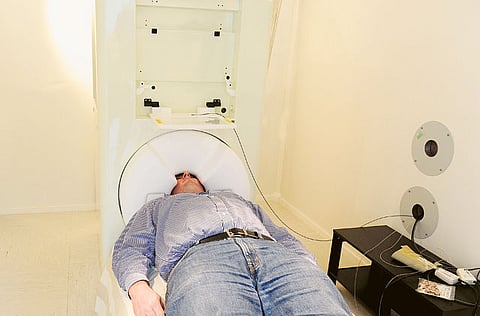Laboratory to study science of language
University establishes centre to understand brain activity associated with speech processing

Abu Dhabi: New York University Abu Dhabi (NYUAD) inaugurated a Neuroscience of Language Laboratory last week to enable researchers to better understand brain activity associated with various cognitive processes. Their research will be facilitated by a special machine called magnetoencephalography (MEG).
The laboratory aims to advance scientific knowledge on how humans neurologically process language — from the basics of constructing words from their root forms to the more complex task of composing sentences.
"This is a unique lab because we are integrating linguistics, which is the scientific study of language, with cognitive neuroscience [aims to understand how complex mental functions are implemented within the brain]," said Dr Alec Marantz, Professor of Linguistics and Psychology at New York University (NYU).
The MEG system is one of the first in the Gulf and is among a few in the world. Students at both NYUAD and UAE University (UAEU) will be encouraged to participate in research initiatives in a range of capacities.
"This is a great opportunity for students from both NYUAD and NYU to be involved in cutting-edge research, both at undergraduate and graduate levels," he said. "They will support as research assistants, but will also learn to design and run their own experiments in the lab."
The MEG was custom-built for NYUAD by Kanazawa Institute of Technology, allowing the research team to make improvements to the design according to the specifications required for the lab's projects.
Partnership
"The MEG machine is a non-invasive brain scanner able to detect minute magnetic fluctuations from neural reactions in the brain, with extreme sensitivity, at millisecond resolution," said Dr Marantz.
He added more than 200 sensors housed in a thermally insulated casing that covers the whole head, allows the scanner to detect activity levels in specific parts of the brain during different cognitive processes. "It is a safe and passive measuring device."
Research in this area can have valuable clinical applications such as providing general insight into the way the brains of individuals with autism, developmental or learning impairments process language. These insight can subsequently lead to more effective diagnosis and treatments.
"This is certainly an area of interest to study in specific populations such as individuals with dyslexia, aphasia or individuals who've suffered strokes," he added.
The NYUAD lab has a partnership agreement with the UAEU's Linguistic Neuroscience of Language Laboratory to share resources and technical expertise and foster research collaboration.
The Department of Linguistics at UAEU already has an established team of researchers working on Arabic and other languages from formal, neuropsychological and developmental perspectives.
The collaboration between the two labs aims to position the UAE as a leader in interdisciplinary linguistics research.
"This partnership between the labs at UAEU and NYUAD will help us achieve our common goals of further developing scientific theory, and testing hypothesis in the field of linguistics," said Dr Sami Boudelaa, Associate Professor of Linguistics at UAEU. "The type of research we are doing also has the potential to yield valuable insight for other fields such as computer sciences, robotics and therapeutic language development."


